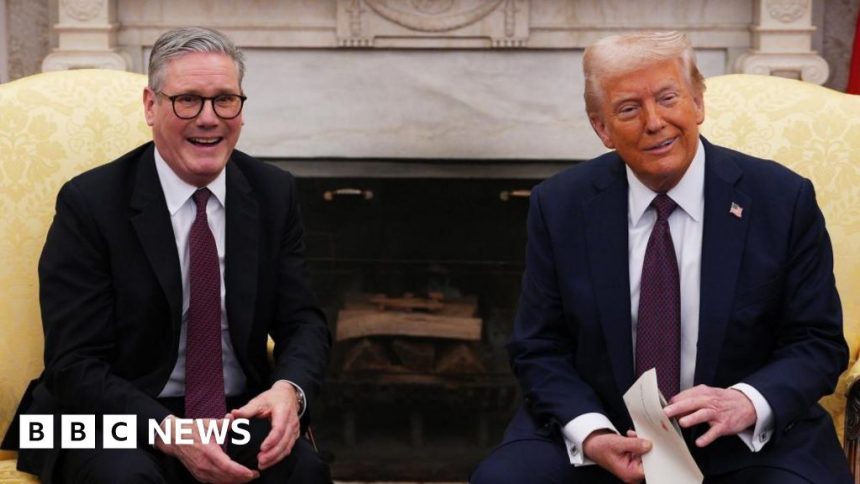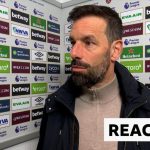Key takeaways from Starmer’s talks with Trump
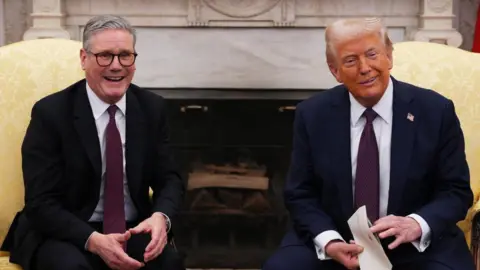 PA Media
PA MediaUK Prime Minister Sir Keir Starmer has met US President Donald Trump during his first visit to the White House.
Here are some of the key moments as the pair took questions from reporters before and after the talks.
1. A surprise letter to Trump from King Charles
Sir Keir did not turn up to the meeting empty-handed.
Part way through their opening remarks, the prime minister reached inside his jacket pocket and pulled out an official letter from King Charles III – an invitation for a second state visit.
Trump appeared to be genuinely taken back for a few seconds, asking: “Am I supposed to read it right now?”
After taking a minute to read the letter, Trump said he accepted the invite and that it would be an “honour” to visit the “fantastic” country.
He added that King Charles was a “beautiful man, a wonderful man”.
During Trump’s first term as president, he met King Charles’s mother, the late Queen Elizabeth II, during a three-day state visit in 2019.
Sir Keir said Thursday’s invitation to host Trump once more for a second full state visit was “unprecedented”.
2. Trump wanted to take charge
While cordial, the initial meeting in the Oval Office between Sir Keir and Trump left no doubt that the US president hoped to be firmly in charge.
The meeting was a pattern we’ve now seen six times with foreign leaders at the Trump White House, including with French President Emmanuel Macron earlier this week: Trump taking control of the room and using the opportunity to get his own messages, both domestic and international, across to the reporters there.
During their half-hour session, Trump leaned forward and slightly towards Sir Keir – wearing a nearly identical, but slightly different coloured tie to Trump’s – dominating the conversation and taking charge of calling on reporters.
A joint afternoon news conference later began with a slightly more diplomatic and matter-of-fact tone, with both Trump and Sir Keir standing at their respective lecterns and going to considerable lengths to lavish praise on the other.
Trump joked he would have been president 20 years ago with Sir Keir’s “beautiful” accent.
At one point, Sir Keir was asked about Trump’s controversial call to make Canada – a member of the Commonwealth – the 51st state of the US.
“I think you’re trying to find a divide that doesn’t exist,” Sir Keir replied.
Trump interjected quickly with the words “that’s enough” before moving on – again taking control of the room as he stood next to a visibly surprised Sir Keir.
3. The similarities between Starmer and Trump
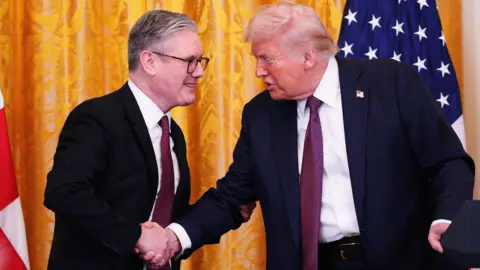 Reuters
ReutersTo put it gently, Sir Keir and Trump are from different schools of politics – both in their style and substance.
But asked to name their similarities Trump said: “He loves his country, and so do I.”
What else do they share? Trump said “we like each other, frankly, and we like each other’s country”.
But the “common thread” between the two men was that “we love our country”, Trump said.
4. Starmer a ‘tough negotiator’
Sir Keir had a number of tricky topics to raise with Trump – from trade to US security guarantees for Ukraine – and at the beginning of their news conference he called his counterpart “a very tough negotiator”.
Asked if the prime minister had convinced him not to impose trade tariffs on the UK, Trump said “he tried”, adding: “He was working hard, I’ll tell you that. He earned whatever the hell they pay him over there.”
But he has said there was “a very good chance” of a trade deal “where tariffs wouldn’t be necessary”.
Such a deal, Trump said, could be made “pretty quickly”.
Sir Keir spoke of a “new economic deal with advanced technology at its core”.
5. Trump ‘minded’ to accept UK’s Chagos deal
Trump said he was “inclined to go along with” the UK’s Chagos Islands deal.
The UK is in talks with Mauritius about handing over the territory but continuing to lease one of the islands, Diego Garcia, which contains a UK-US military airbase.
The agreement has been mired in uncertainty after Trump’s re-election as US president, given several US Republicans have argued it could deliver a potential security boost to China.
But during the meeting, Trump said he had a “feeling” the deal was going to “work out very well”.
6. ‘Did I say that?’ Trump walks back comments on Zelensky
Last week, Trump made headlines by calling Ukrainian President Volodymyr Zelensky a “dictator” in a social media post, echoing Russian claims about Kyiv’s cancelled elections.
An election was scheduled for May 2024, but it was suspended because Ukraine has been under martial law since Russia began its full-scale invasion.
Asked by the BBC’s Chris Mason about his use of the word “dictator”, Trump replied: “Did I say that? I can’t believe I would say that.”
In the news conference later, Trump also appeared to have softened his attitude to Zelensky, praising him as “very brave” and saying the pair got on “really well”.
Talking about the potential for a peace deal between Ukraine and Russia, Trump said “progress towards peace” would continue when Zelensky visits the White House on Friday. The two are expected to sign a major minerals deal.
7. Starmer hits back at free speech criticism
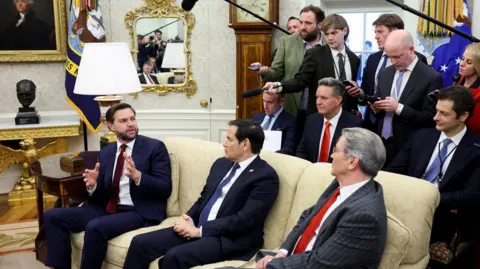 Reuters
ReutersAt the Munich Security Conference last week, US Vice President JD Vance attacked the UK and other European democracies, warning that “free speech is in retreat.”
Asked about the comments, Trump called on his deputy to defend himself. Vance argued “there have been infringements on free speech that actually affect not just the British” but also “American technology companies and by extension, American citizens”.
That led to Sir Kier cutting in, saying “we’ve had free speech for a very, very long time in the United Kingdom – and it will last for a very, very long time”.
He rejected Vance’s claim, saying “in relation to free speech in the UK, I’m very proud of our history there”.



